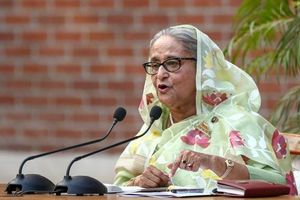Geoffrey Hinton recently stirred the pot with remarks about Sam Altman's ousting from OpenAI, asserting his pride over the role one of his former students played in the dramatic shakeup.
Hinton, who has earned his stripes as one of the pioneers of artificial intelligence (AI), celebrated the bold boardroom move made by Ilya Sutskever, his protégé and the Chief Scientist at OpenAI, during press comments following his Nobel Prize win. His recognition of Sutskever’s actions sent ripples through both AI circles and mainstream media, raising eyebrows and sparking discussions about the ethical direction of AI development.
Hinton, only recently basking in the glory of winning the prestigious Nobel Prize for his groundbreaking work on artificial neural networks, found himself at the center of attention once again as he reflected critically on the rising focus on profits within AI companies, particularly pointing fingers at Altman. He remarked on the need for ensuring AI safety and aligning technological advances with ethical responsibility, voicing concerns about Altman’s increasing emphasis on profitability over responsible AI deployment.
At the press briefing, Hinton expressed disappointment with what he views as Altman’s shift—from prioritizing the groundbreaking potential of AI to pursuing profit margins. This focus, he argued, could jeopardize the safety of advanced AI systems, especially as they become more sophisticated and unpredictable. "Altman’s focus on profits has raised concerns within the AI community, particularly around the risks associated with advanced AI systems," Hinton stated, underlining the urgent need for continued research and active measures to manage these risks.
Delving deeply, Hinton highlighted the unsettling nature of AI technology, which can potentially exceed human intelligence. He recognized the growing unpredictability of AI models consisting of numerous parameters and their opacity, often referred to as “black box” systems. These characteristics make it increasingly challenging to ascertain how these models derive their conclusions, raising existential questions about humanity’s grasp on such advanced technologies. Hinton voiced his worries: "When AI systems become more intelligent than humans, there is uncertainty over whether we will be able to control them." His statement reflects apprehensions shared by leading AI researchers and advocates who are calling for more substantial frameworks focused on AI governance and safety.
The recent uproar over Altman’s dismissal brings to light not only boardroom battles but also broader discussions on ethical challenges within the rapidly advancing AI industry. The debate over AI safety is even spilling over to legislative spheres, as evidenced by California's push for AI safety regulations. Yet, this noble endeavor to regulate and mitigate risks suffered a setback when Governor Gavin Newsom vetoed the proposed bill, which had already faced considerable opposition from prominent Silicon Valley figures. Hinton's commentary came as some sort of endorsement of the calls for ethical AI practices, insinuated through his statements, as he aligned himself with the growing discourse urging for stricter ethical codes around AI development.
Reflecting on his own legacies, Hinton acknowledged the importance of his collaborators and students throughout his career, sharing heartfelt praises accusing them of playing pivotal roles throughout his groundbreaking work. His mention of Sutskever’s actions pointed to the heavier conversations around the responsibilities of those wielding power within influential tech companies. "They’ve gone on to achieve remarkable things," Hinton noted, indicating satisfaction with the broader impact he and his students have had on the field. The sentiments expressed are not merely nostalgia but rather reflect his hope for future generations of AI researchers to value ethical frameworks alongside technological prowess.
Meanwhile, the fallout from Altman’s brief ousting reverberated through OpenAI. Though Sutskever expressed immediate regret over his role, Altman was reinstated within days, which has only added layers to the already complex narrative surrounding power struggles and ethical standards within AI development. The swift reinstatement inevitably begs questions about the underlying motives of board decisions, with critics asserting the rapidity of the return reflects poorly on governance structures within AI organizations.
Hinton’s remarks also highlight the necessary discussions about corporate responsibility amid the competitive tech marketplace. With technology advancing at breakneck speed, the expectations placed on companies to prioritize safe deployment over profitability have escalated. Differences between executives like Altman, who may prioritize financial results, and researchers like Hinton, who advocate for caution and responsibility, draw attention to the pivotal battle lines being drawn as tech companies navigate the AI revolution.
With the stakes raised, as evidenced by the tangled web of corporate interests and ethical discussions, Hinton’s bold statements only signify the urgencies surrounding AI safety. His assertion of pride over Sutskever’s actions suggests support for those who challenge conventional business avenues to advocate for safe practices and responsible innovation. Hinton’s commentary serves not only as criticism but also as a call to action for AI practitioners to remain vigilant about the ramifications of their innovations.
Although discussions surrounding Hinton's Nobel Prize and the revolution he led with AlexNet often celebrate the successes of AI research, they also spark pressing dialogues on the ethical trajectories the industry could take. Hinton's shift to focusing on AI safety reflects his acknowledgment of the pressing societal concerns present as AI systems mature. These discussions, as noted, are only gaining momentum within both industry perspectives and societal conversations.
The ethical debates surrounding AI’s future seem far from fading and instead are likely to become louder as practitioners juggle between profitable pursuits and safety consciousness. The industry stands at a crossroads—balancing the exhilarating potential of AI advancements against the complex and nuanced fabric of ethical responsibilities, with Hinton asserting his place on the side of caution and responsibility.
Hinton's statements perpetuate the discussion of responsibility moving forward and commendably urge tech leaders to maintain the course of ethical governance. While Altman’s focus on profitability continues to stir concern, Hinton emphasizes the necessity for broader conversation—advocacy for diligent research and proactive measures within the AI safety sphere as the technological horizon rapidly evolves.
Indeed, Hinton's statement of pride over the changes initiated by his students calls for reflection on how future leaders will navigate the ever-evolving standards within the AI industry. Readers and enthusiasts alike stare forward, grappling with what ethical landscapes might lie just beyond tomorrow as technology continues to test the boundaries of innovation.



